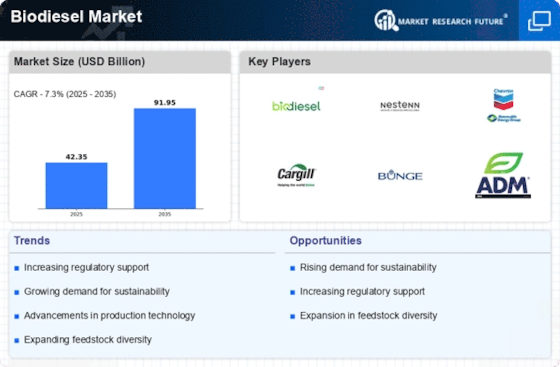Market Analysis
In-depth Analysis of Biodiesel Market Industry Landscape
Global geopolitical events and trade dynamics also play a role in shaping the biodiesel market. Trade agreements, tariffs, and geopolitical tensions can impact the availability and cost of biodiesel feedstocks, influencing market dynamics. Changes in international trade policies can create both opportunities and challenges for biodiesel producers, affecting their ability to access key markets and compete effectively. Consumer awareness and acceptance are critical elements in the market dynamics of biodiesel. As awareness of environmental issues grows, consumers are more likely to choose biodiesel as a cleaner alternative, driving demand and market growth. Government initiatives to educate the public about the benefits of biodiesel and incentivize its use further contribute to changing consumer preferences. The biodiesel market is shaped by a complex interplay of regulatory, technological, environmental, economic, and social factors. The ongoing commitment to sustainability, coupled with advancements in technology and supportive government policies, positions biodiesel as a key player in the evolving landscape of the energy market. As the world continues to prioritize cleaner and more sustainable energy solutions, the biodiesel market is expected to witness further growth and transformation in response to these dynamic forces. However, during periods of low fossil fuel prices, the competitiveness of biodiesel may be challenged. A focus on technology and process optimization is a key strategy to improve market share positioning. Biodiesel producers invest in research and development to refine production processes, increase efficiency, and reduce costs. Advancements in technologies such as enzymatic transesterification and continuous processing contribute to higher-quality biodiesel and improved production scalability. By staying at the forefront of technological innovation, companies can gain a competitive edge and secure a larger market share. Market players also employ brand positioning strategies to differentiate their biodiesel products. Building a strong and recognizable brand that communicates environmental sustainability, product quality, and corporate responsibility can influence consumer choices. Companies often invest in marketing and communication efforts to highlight their commitment to sustainability and showcase the positive impact of their biodiesel products on the environment. A positive brand image can attract environmentally conscious consumers and businesses, contributing to increased market share. Furthermore, market share positioning involves a keen focus on regulatory compliance. Demonstrating a commitment to environmental responsibility through regulatory compliance can enhance a company's reputation and contribute to its market share positioning. Cost leadership is a fundamental strategy employed by biodiesel producers to gain a competitive advantage and expand market share.


















Leave a Comment